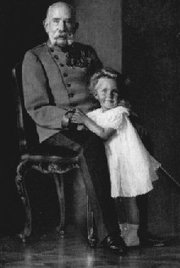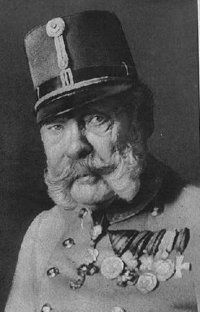Franz Joseph I of Austria
|
|
Kaiser_Franz_Joseph_tomb_-_Vienna.jpg
Franz Josef I (in English also Francis Joseph) (August 18, 1830 – November 21, 1916) of the Habsburg Dynasty was Emperor of Austria and King of Bohemia from 1848 until 1916 and King of Hungary from 1867 until 1916. He was born in Vienna, Austria.
Archduke Franz was the oldest son of Archduke Franz Karl (and Sophie, Archduchess of Austria and Princess of Bavaria), who was brother and heir of Austrian Emperor Ferdinand I. Because his father renounced his claim to the throne, Franz became emperor as Franz Joseph I when Ferdinand abdicated near the end of the Revolution of 1848.
In 1854 Franz Joseph married Duchess Elisabeth in Bavaria (also Princess of Bavaria through her mother's side of the family), who became Elisabeth of Austria ("Sisi" or "Sissi"). Their only son, Crown Prince Rudolf, committed suicide in 1889 in the (in)famous Mayerling episode with his young mistress Baroness Mary Vetsera. Rudolf's killing of the Baroness Vetsera was an extremely grim chapter in the long line of outbreaks of mental instability in the Habsburg Dynasty caused by their long history of inbreeding. The younger brother to Emperor Franz Joseph, the Archduke Viktor Ludwig, spent most of his life exiled on the island of Capri, following a series of scandals involving dressing up in women's clothes and molesting his military aides.

Notwithstanding the scandals, there were times when Franz Joseph took firm moral stands. When Pope Pius IX detained the six year old Jewish boy Edgardo Mortara on account of the claim that a housekeeper had secretly baptized him, Emperor Franz Joseph sent the Pope a plea to return the child to his parents. The Pope refused his request.
When World War I erupted, Austria-Hungary fought in alliance with Germany, but the Austro-Hungarian Army proved ill-prepared and ill-equipped. Franz Joseph's conservatism was partly to blame: when presented with the suggestion that the army should acquire a newly-developed mechanical weapon, namely tanks, he famously retorted: "Absolutely not. The horses will be startled!".
Their three other children were Sophie, Archduchess of Austria (1855 - 1858), Gisela, Archduchess of Austria (1856 - 1932) and Marie-Valerie, Archduchess of Austria (1868 - 1924).
The archipelago Franz Josef Land in the Russian high arctic was named in his honor in 1873. Franz Josef Glacier in New Zealand's South Island also bears his name.
Names in other languages: German: Franz Josef, Italian: Francesco Giuseppe, Czech: František Josef, Hungarian: I. Ferenc József, Slovak: František Jozef I, Polish: Franciszek Józef, Croatian: Franjo Josip, Slovenian: Franc Jožef, Serbian: Franc Josif, French: François-Joseph, Yiddish: Yankele Yosef (It is a Yiddish joke to call him Emperor Yankele Yosef because he was very kind to the Jews).
Official Grand Title of Franz Josef I from 1849
His Imperial and Apostolic Majesty,
Franz Joseph I,
By the Grace of God, Emperor of Austria, King of Hungary and Bohemia,
King [of Lombardy and Venice]1, of Dalmatia, Croatia, Slavonia, Lodomeria and Illyria; King of Jerusalem etc., Archduke of Austria; Grand Duke of Tuscany and Cracow, Duke of Lorraine, of Salzburg, Styria, Carinthia, Carniola and of the Bukovina; Grand Prince of Transylvania; Margrave of Moravia; Duke of Upper and Lower Silesia, of Modena, Parma, Piacenza and Guastalla, of Auschwitz [Oświęcim] and Zator, of Teschen [Cieszyn/Těín], Friuli, Ragusa [Dubrovnik] and Zara [Zadar]; Princely Count of Habsburg and Tyrol, of Kyburg, Gorizia and Gradisca; Prince of Trent [Trento] and Brixen [Bressanone]; Margrave of Upper and Lower Lusatia and in Istria; Count of Hohenems, Feldkirch, Bregenz, Sonnenberg, etc.; Lord of Trieste, of Cattaro [Kotor], and in the Wendish Mark; Grand Voivode of the Voivodina of Serbia etc. etc.
1 removed from the title in 1866/1869 after the loss of the Italian countries.

